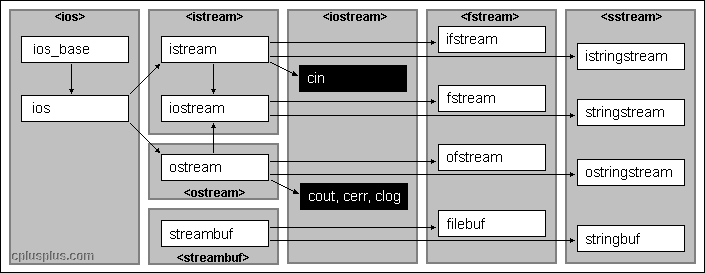씹어먹는 C++ 10일차
❗참고 : https://modoocode.com/213
C++ 입출력 라이브러리

- 그림에 대한 상세 설명은 https://modoocode.com/143 를 참고할 것.
iostream 클래스
- 실제로 입력을 수행하는 클래스
- operator » 연산자가 정의되어 있음
- 공백 문자 (띄어쓰기, 엔터, 탭)을 입력시에 무시함
- 공백 문자에 따라 각각을 분리해서 입력받음
std::cin >> a;
ios 클래스의 상태 관리 플래그
- 총 4개의 스트림 상태 관리 플래그가 존재 (0 or 1)
- goodbit : 스트림에 입출력 작업이 가능할 때
- badbit : 스트림에 복구 불가능한 오류가 발생했을 때
- failbit : 스트림에 복구 가능한 오류 발생시
- eofbit : 입력 작업시에 EOF에 도달 시
#include <iostream>
#include <string>
int main() {
int t;
while (true) {
std::cin>>t;
std::cout << "입력 :: " << t << std::endl;
if (std::cin.fail()) { // failbit check
std::cout << "제대로 입력해주세요." << std::endl;
std::cin.clear(); // 플래그 초기화
std::cin.ignore(100, '\n'); // 개행 문자가 나올 때까지 무시 - 최대 100자
}
if (t == 0) break;
}
return 0;
}
형식 플래그(format flag)와 조작자(Manipulator)
형식 플래그 : std::setf() 활용
#include <iostream>
#include <string>
int main() {
...
std::cin.setf(std::ios_base::hex, std::ios_base::basefield);
...
}
- cin.setf(p1, p2)를 이용하여 입력을 16진수로 받음
- 인자가 1개인 setf() : 인자로 준 형식 플래그를 적용
- 인자가 2개인 setf() : p2(basefield)의 내용을 초기화 하고, p1(hex)를 적용
조작자 : std::hex를 활용
#include <iostream>
#include <string>
int main() {
...
std::cin << std::hex << t;
...
}
- hex가 cin에서 값을 입력받는 방식을 변경함
- Manipulator : 스트림을 조작하여 입출력 방식을 변경하는 함수
- std::ios_base& hex(std::ios_base& str);
- std::endl : 개행 문자 추가 및 buffer flush 수행
- 문자를 내보낸다고 화면에 출력되지 않음. buffer에 모았다가 한꺼번에 출력함, flush는 버퍼를 비워주는 역할
stream buffer
- 모든 입출력 객체는 이에 대응되는 스트림 객체를 가짐
- C++의 입출력 라이브러리는 이에 대응되는 스트림 버퍼 클래스가 존재함 » streambuf 클래스
- std::stringstream : 평범한 문자열을 스트림인것처럼 이용할 때 사용함
streambuf class
- 스트림의 상태를 위해 시작, 다음으로 읽을 문자, 끝을 나타내는 3가지 포인터를 가짐
- 버퍼의 종류에 따라 입력 버퍼 (get area), 출력 버퍼 (put area)을 구분함
❗참고 : https://modoocode.com/215
C++ 파일 입출력
ifstream을 이용한 파일 입력
- istream - ifstream
- ostream - ofstream
- ifstream과 ofstream을 모두 포함하는 라이브러리 : fstream
#include <fstream>
#include <iostream>
#include <string>
int main() {
std::ifstream in("test.txt");
std::string s;
if (in.is_open()) {
in >> s;
std::cout << "입력 받은 문자열 :: " << s << std::endl;
} else {
std::cout << "not found file" << std::endl;
}
return 0;
}
- is_open : istream에 없고, ifstream에서 상속받으면서 추가된 함수
- 파일이 열렸는지 유무를 리턴
- true : file이 있는 경우
- fail : file이 없는 경우
- 일반적인 경우, ifstream객체의 소멸자에서 자동으로 파일을 close 해줌
- is_open에 대해 ifstream 소멸자에서 close되지 않는 경우
- std::ifstream 객체를 재사용 하는 경우
- close() 후 open()을 이용하여 is_open() 순으로 객체 재사용
- std::ifstream 객체를 재사용 하는 경우
#include <fstream>
#include <iostream>
#include <string>
int main() {
std::ifstream in("test.txt");
std::string s;
if (in.is_open()) {
in >> s;
std::cout << "입력 받은 문자열 :: " << s << std::endl;
} else {
std::cout << "파일을 찾을 수 없습니다!" << std::endl;
}
in.close();
in.open("other.txt");
if (in.is_open()) {
in >> s;
std::cout << "입력 받은 문자열 :: " << s << std::endl;
} else {
std::cout << "파일을 찾을 수 없습니다!" << std::endl;
}
return 0;
}
- 이 외에 파일 전체 읽기 / 파일의 내용을 한줄 씩 읽기 등을 제공
ofstream을 이용한 파일 출력
- std::ofstream
- ios::binary : binary 형태로
- ios::app : 기존 파일의 내용 뒤에 붙여넣기
- ios::ate : 자동으로 파일 끝에서부터 읽기와 쓰기 수행 (기존 파일 내용을 보존하지 않음)
- ios::trunc : 파일 스트림을 열면 기존 내용을 모두 삭제 (default)
- ios::in, std::ios::out : 파일에 입력할지, 출력할지 지정
- ifstream과 ofstream 객체를 생성 시, 지정되어 있음
#include <fstream>
#include <iostream>
int main() {
std::ofstream out("test.txt"); // 기존 내용 삭제 후 새로 쓰기
std::ofstream outa("test.txt", std::ios::app); // 기존 파일의 내용에 append
if (out.is_open()) {
out << "이걸 쓰자~~";
}
if (out2.is_open()) {
out2 << "덧붙이기";
}
return 0;
}
std::ofstream 연산자 오버로딩
#include <fstream>
#include <iostream>
#include <string>
class Human {
std::string name;
int age;
public:
Human(const std::string& name, int age) : name(name), age(age) {}
std::string get_info() {
return "Name :: " + name + " / Age :: " + std::to_string(age);
}
friend std::ofstream& operator<<(std::ofstream& o, Human& h);
};
std::ofstream& operator<<(std::ofstream& o, Human& h) {
o << h.get_info();
return o;
}
int main() {
// 파일 쓰기 준비
std::ofstream out("test.txt");
Human h("이재범", 60);
out << h << std::endl;
return 0;
}